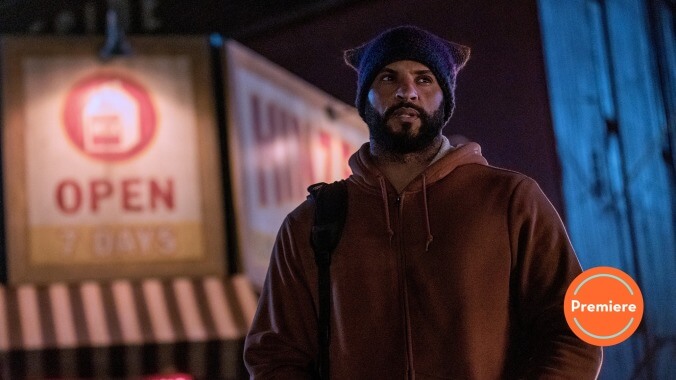Season three certainly seems to want to get back to what made the first season such a hit. It starts with a fake-out within a fake-out, as a set of dancers performing Swan Lake are revealed to merely be the opening of a heavy metal stage show lead by Johan (Marilyn Manson). But even that is only a feint, as Johan’s show is not a rock and roll performance, but a house of worship dedicated to Odin. Ian MacShane has a ball with it, showing up in furs and leathers, swan-diving off the balcony into the outstretched arms of the audience, and crowd-surfing to the stage, where Johan fetes him.
This opening scene is a reminder American Gods’ dirty little secret from the beginning was that there wasn’t enough material to make a proper multi-season prestige TV series. As a selection to follow in the footsteps of Game Of Thrones, it was a good concept—a novel with a passionate built-in fan base, which filled the fantasy brief as being the flip side of the GOT coin. That was an American’s fantasy of British history; this is a Brit’s fantasy of America’s past and future. But Thrones brought multiple 800-page novels to the table with which to fill out 10-episode seasons. American Gods had a single 300-page book (plus two slimmer follow-ups), in which the first season only used the first 125.
That means filler was the name of the game for the show’s success. Fuller used it to examine the human need for spirituality and how we, as a modern-day society, fill the absence of a monocultural theocratic symbol. Season two lost that thread, and seeing it revived here is a good sign.
But the meditation on underground countercultures as substitutes for a larger sense of spiritual belonging is short-lived. Soon, we’re back to season two’s biggest failure, the insistence on keeping both Laura and Mad Sweeney alive well past their expiration dates. The good news is season three seems to be willing to put at least one to rest, as Laura finally rips out the lucky coin keeping her alive in hopes it will embed in Sweeney, bringing him back. But sadly, it rolls away as she turns to dust, leaving him dead in the crypt.
There’s better news for the New Gods, as season three attempts to use some of what went down in season two to its advantage. Cast resignations in the wake of Fuller’s firing meant Media had to be recast, establishing that these gods can change their faces (and therefore actors) when necessary. Season three uses that to convert Crispin Glover as Mr. World to Dominique Jackson as Ms. World. (Whatever happens to Ryan Murphy at Netflix, he’ll always have Pose.) Not that Jackson has much more to do, other than carefully-edited-for-cable violence, but she does it with so much more panache, it’s almost forgivable. But the plot, especially the Technology Boy vs. Bilquis stuff, remains at a standstill. Tech Boi wants her to join the New Gods; she prefers to stay neutral. Tech Boi fails to persuade her. Eventually, something will happen here, but today is not that day.
The one thing everyone can agree on is the road trip between Odin and Shadow is the heart of the show. As long as that part works, the show has a central axis on which to turn. Season two rode on it heavily until the wheels came off, and Shadow went to start a new life as Mike. Season three shows up in this new life and immediately derails it to put Shadow back out on the road with Odin. Next stop: Whiskey Jack (Graham Greene), where the Native American deity pushes Shadow on his destiny before rebuffing Odin, reminding him that the white men who the Nordic God came here with are responsible for centuries of death for his people.
Not that it stops Odin, who is ready to head out to meet with another, the Night Carrier. But Shadow has once again had enough. That Odin lets him go so easy can only mean that whatever Shadow does, he’ll wind up heading to Lakeside, the place Odin has been trying to send him since season two. Whether or not the Old God meant for the key to break off in the lock of Shadow’s new apartment and wind up with a shotgun to the back of his head remains to be seen. But considering everything else is going plan, it doesn’t seem that irrational to believe.
Stray observations
- As always, the soundtrack to the series is A-plus-mazing. Even when nothing is happening, this show is doing fantastic work with song choices.
- Line of the week, New God edition: “You and I both know that a direct pipeline into every cerebral cortex is a no-brainer.”
- Line of the week, Old God edition: “I don’t see any conflict in enlightened self-interest.”
- Sweeney spent two seasons demanding his lucky coin back, only to drop it at the worst time. Maybe the coin doesn’t want you, man.
- I don’t know where one studies to become a Dominologist, but I now assume there is a Doctorate of Dominology.
- The way those buses disappear from the schedule on a blizzard evening is the real cancel culture.










































